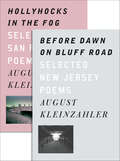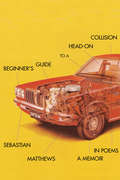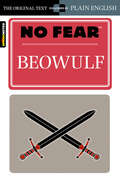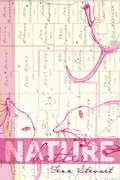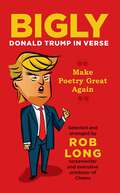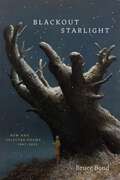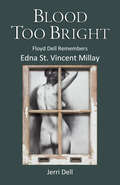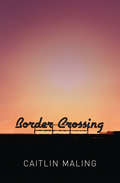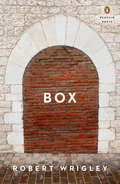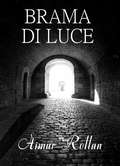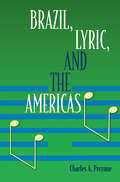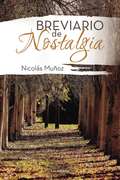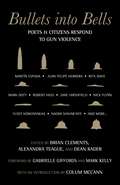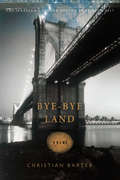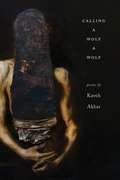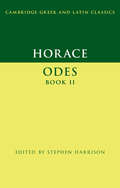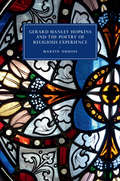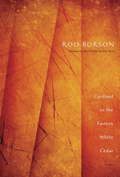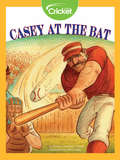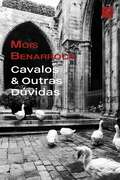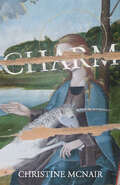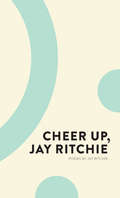- Table View
- List View
Before Dawn on Bluff Road/Hollyhocks in the Fog: Selected New Jersey Poems/Selected San Francisco Poems
by August KleinzahlerA collection of August Kleinzahler’s best poems, divided—like his life—between New Jersey and San FranciscoWhen August Kleinzahler won the 2004 Griffin Poetry Prize for his collection The Strange Hours Travelers Keep, the judges’ citation referred to his work as “ferociously on the move, between locations, between forms, between registers.” They might also have added “between New Jersey and San Francisco,” the places Kleinzahler has spent his life traveling between, both on the road and on the page. This collection assembles the best of his New Jersey and San Francisco poems for the first time, organized according to place, with each city receiving its own title and cover. Providing readers with a gorgeous guide to Kleinzahler’s interior geography, Before Dawn on Bluff Road (New Jersey) and Hollyhocks in the Fog (San Francisco) function as both word-maps and word-anatomies of one of our greatest poet’s lifelong passions and preoccupations.
Beginner's Guide to a Head-On Collision: A Memoir in Poems
by Sebastian MatthewsThe award-winning author of In My Father&’s Footsteps combines prose and poetry in a poignant memoir that captures the aftershocks of a tragic car accident. &“Beginner&’s Guide to a Head-on Collision offers the deeply moving poetic memoir of Sebastian Matthews&’s life in the years after the car accident that devastated him and his wife and son. The poems, which often read like electric improvised prayer-songs, intimately evoke the terrors and wonders of catastrophic physical injury and of &‘life re-booted.&’ They are disturbing, eerie poems that embody the paradoxes of being The Dead Man at the crossing. They are amazingly honest in their hopeful, mystical sense of fate. In this unforgettable book, the reader is present at the scene of the accident where the hovering spirit that has departed the body addresses the living person re-entering his brokenness and answering for his transcendent awareness.&” —Kevin McIlvoy, author of Hyssop &“These poems detail both physical and spiritual misery, and though suffering can turn us into many things, Matthews—our banged-up storyteller, singer, docent—strives to deliver himself back to a body of affection, intimacy, and kindness. Beginner&’s Guide to a Head-on Collision is a remarkable record of that difficult journey.&” —Patrick Rosal, author of Brooklyn Antediluvian &“By reading Beginner&’s Guide to a Head-on Collision we learn how to go in and out of the body as necessary and, in order to take in the possibility of a larger life, how to wrest from breakage release from our thin views of who we are.&” —Vievee Francis, author of Forest Primeval
Beowulf (No Fear #3)
by SparkNotesRead great works of literature with NO FEAR—and actually understand what they mean!No Fear Literature puts the world&’s finest books at your fingertips! With the complete original text on the left-hand page, and an easy-to-follow translation on the right to guide you, you can fully grasp the meaning and brilliance of each classic. Although Beowulf is a masterpiece of early English literature, written approximately between 975 and 1025, the unfamiliar dialect makes this epic poem difficult to understand. Thanks to this translation, placed right near the original text, readers can now appreciate the battle of good and evil that unfolds between the wise and heroic Beowulf and his enemies—the monstrous Grendel and a fire-breathing dragon. Each No Fear guide contains: The complete original textA line-by-line translation that puts the text into everyday languageA complete list of characters with descriptionsPlenty of helpful commentary
Better Nature
by Fenn StewartMuch of the language that makes up Better Nature—the first poetry collection by writer and academic Fenn Stewart—is drawn from a diary that Walt Whitman wrote while travelling through Canada at the end of the nineteenth century.But rather than waxing poetic about the untouched Great White North, Stewart inlays found materials (early settler archives, news stories, email spam, fundraising for environmental NGOs, and more) to present a unique view of Canada's "pioneering" attitude towards "wilderness"—one that considers deeper issues of the settler appropriation of Indigenous lands, the notion of terra nullius, and the strategies and techniques used to produce a "better nature" (that is, one that better serves the nation).
Bigly: Donald Trump in Verse
by Rob Long"Poets, wrote Shelley, are 'the unacknowledged legislators of the world.' Big deal. But now for the rst time ever a poet is the Leader of the Free World, and he's even more totally unacknowledged—by Democrats, the media, Lena Dunham, Deep State leakers, and other losers. This superb collection of winning verse, brilliantly edited by Rob Long, spans the decades from the early 'Table at Le Cirque' to my personal favorite 'The Mantle of Anger.' With this dazzling anthology, bitter fake-news hacks for whom Trump is beyond reason will have to admit that he's also beyond rhyme (except for page 74)." —MARK STEYN, bestselling author of America Alone, After America, and The Undocumented Mark Steyn "This book pleased me so much, I culturally appropriated Haiku to contribute to the cover." — MILO YIANNOPOULOS"More lyrical than Walt Whitman, pithier than Robert Frost—and making a heck of a lot more sense than Emily Dickinson, this book should be required reading for every Literature major on campus."—JAMES DELINGPOLE, columnist at Breitbart.com and The Spectator and author of 365 Ways to Drive a Liberal Crazy and The Little Green Book of Eco-FascismBigly is hilarious compilation of memorable quotes from President Donald Trump arranged as poetry that will have the president's fiercest supporters and harshest critics asking the same question: Can a president appoint himself Poet Laureate? Divided into sections on Life, Love, Beauty, and Death—and including a dedicatory haiku by Milo Yiannopoulos, a foreword by How to Lose Friends and Alienate People author Toby Young, and poignant editor's notes that reveal the hidden meaning in Trump's expert verse—Bigly is a must-have for political junkies who've been following President Donald Trump's unconventional speeches, interviews, complaints, jokes, quips, and witticisms.
Blackout Starlight: New and Selected Poems, 1997-2015
by Bruce BondBlackout Starlight brings together a selection of poems from nine previously published books, along with a generous assortment of new work. At the heart of this collection are investigations of the role of eros, language, and creative life, and of the wonder and anxiety of their absence. In Bond’s telling, the lines between real and unreal, living and dead, blur together in the poet’s imagination, casting an equally compassionate eye upon “the man we see writhing in the marble” of an uncarved statue and the son at a funeral trying to face “the other half of life, the part / without my father in it.”Taken together, the selections in this book represent the highlights of a dazzling career in poetry and leave the reader eager for many more years of Bond’s verses to come.
Blood Too Bright: Floyd Dell Remembers Edna St. Vincent Millay
by Floyd Dell Jerri DellWhat lips my lips have kissed, and where, and why,I have forgotten*One hundred years ago, Bohemian author and editor of the radical Masses magazine, Floyd Dell, began a passionate affair with a newcomer to Greenwich Village — the yet to be discovered “girl poet,” Edna St. Vincent Millay. In the years that followed, both Dell and Millay became symbols of early 20th century feminism, rebellion and literary freedom.A century later, while poring over her grandfather Floyd’s papers at Chicago’s Newberry Library, Jerri Dell discovered hundreds of handwritten letters and an unpublished memoir about his love affair with Millay. Finding him as outlandish, entertaining and insightful as he was when she knew him fifty years before, she chose to bring him and his poet lover back to life within the pages of this book.Admirers of Edna Millay — as well as literary and political history buffs, Bohemian Village enthusiasts, and readers interested in writers who famously influenced social norms — are sure to enjoy this eye-witness account of a fascinating woman and exceptional poet. My candle burns at both ends;It will not last the night* *Excerpts from Sonnet XLIII and First Fig by Edna St. Vincent Millay
Border Crossing
by Caitlin MalingCaitlin Maling's second volume, Border Crossing, continues to showcase the development of an exciting new voice in Australian poetry. Now Maling's poems shift from the first volume's gritty treatment of childhood and adolescence growing up in WA, to a consideration of what it is to be an Australian in America, where the conflicting voices and identities of home and abroad jostle against and seek their definitions from each other. In this volume, as in the first, her emphasis on place – geography and environment – is as strong as ever.
Box
by Robert WrigleyA powerful new collection from an acclaimed, award-winning poetWith nine previously published collections of poetry, Robert Wrigley has become one of his generation's most accomplished poets, renowned for his irony, power, and lucid style and for his ability to fuse narrative and lyrical impulses.Wrigley's tenth collection, Box, is a book of poems obsessed with human containment, with the way people are contained or confined—by time, mortality, technology, identity, culture, and history—in almost everything they are and everything they do. Even the body, even the poem itself, is in this regard a kind of self-containing crate, in which the human being, perhaps the human spirit, is shipped into the world at large. But Box is also a book obsessed with escape from containment, and escape comes from dreams, from deep awareness, from contemplation, from love, and above all, as Wallace Stevens insisted, from "the imagination pressing back against the pressure of reality." The poems in Box aim to do nothing less than "help people live their lives," as Stevens put it.From the Trade Paperback edition.
Brama di Luce
by Valeria Bragante Aimar RollanPer i Sufiti non c’è castigo peggiore che provare nostalgia, sapendo di essere separati dalla fonte, né maggiore ricompensa che sentirsi uniti ad essa. Così, l’emozione che predomina in quest’opera è la nostalgia, ed il conseguente desiderio di liberarsi da essa e fondersi con l’Unità. Questa è la storia di una caduta, di una perdita, di un recupero e di una ascensione. È la storia di una ricerca della luce dall’oscurità più profonda. È scritta in prosa poetica, con breve frammenti indipendenti tra loro, che si possono leggere in modo isolato ma che mantengono una certa coesione, dato che ogni frammento porta con sé, o brama, un po’più di luce del precedente. Parla di un uomo che ha perduto la propria luce, ma che conserva dentro di sé un lieve scintillio del ricordo di essa. Questa fugacità tortura la sua mente e gli fa intraprendere un cammino di ascensione per recuperare un tesoro tanto prezioso. Passa attraverso tutte le fasi di depressione, tristezza e malinconia, crogiolandosi nella propria perdita. Nelle fasi iniziali identifica questa luce perduta con l’amore di una donna, con l’amore di molte donne che per lui sono una, e l’origine della sua malinconia è la perdita di questo amore. Man mano che il suo tormento avanza, riconosce che questa luce desiderata appartiene a qualcosa di più sottile e profondo, al regno della sua anima … Riconosce che questo dolore emozionale proviene dal sentirsi separato dalla fonte primordiale. Questa opera è scritta con un linguaggio malinconico, ma sullo sfondo vuole trasmettere bellezza, speranza ed allegria.
Brazil, Lyric, and the Americas
by Charles A. Perrone"This is Perrone at his most brilliant. Erudite but accessible, thorough but playful: Brazil, Lyric, and the Americas is the latest contribution by the most knowledgeable U.S.-based scholar of the Brazilian lyric."--Severino Joao Albuquerque, University of Wisconsin "Perrone retraces the dialogue of the Brazilian lyric with the poetry of the Americas in the generous spirit that the poets' utopia of solidarity will serve as a counterpoint to the harsher side of globalization."--Luiza Moreira, Binghamton University In this highly original volume, Charles Perrone explores how recent Brazilian lyric engages with its counterparts throughout the Western Hemisphere in an increasingly globalized world. This pioneering, tour-de-force study focuses on the years from 1985 to the present and examines poetic output--from song and visual poetry to discursive verse--across a range of media. At the core of Perrone's work are in-depth examinations of five phenomena: the use of the English language and the reception of American poetry in Brazil; representations and engagements with U.S. culture, especially with respect to film and popular music; epic poems of hemispheric solidarity; contemporary dialogues between Brazilian and Spanish American poets; and the innovative musical, lyrical, and commercially successful work that evolved from the 1960s movement Tropicalia.
Breathe and Be: A Book of Mindfulness Poems
by Kate Coombs Anna Emilia LaitinenHear thunder crash, feel your toes touch sand, and watch leaves drift softly away on a quiet stream. The simple poems in Breathe and Be help children learn mindfulness as they connect to the beauty of the natural world. Mindfulness teaches us how to stay calm, soothe our emotions, and appreciate the world around us. Whether we’re watching tiny colored fish darting in the water or exploring the leaves, branches, and roots of a towering tree, the thoughtful words and the lovely art of Breathe and Be remind us how much joy we can find by simply living with awareness and inner peace.
Breviario de nostalgia
by Nicolás MuñozUn poemario de madurez que se demora con acierto en la melancolía de una vida revisada. Breviario de nostalgia es el primer libro de Nicolás Muñoz, un poemario de madurez que se demora con acierto en la melancolía de una vida revisada. <P><P> Siendo esa su idea vertebradora, no deja de surgir, al tiempo, una variedad temática producto de una mirada vuelta hacia el pasado. En sus páginas, el lector se encontrará invadido por una atmósfera que le hará partícipe y cómplice del universo del protagonista-poeta. <P>Cada texto va desvelando parte de su identidad: los recuerdos de la infancia, los éxitos y los fracasos, la búsqueda del interlocutor, la vida, quizá un poco más canalla, la escritura misma... <P>Hay intensidad y también calma, un juego de contrapesos entre la cara amarga y el amor en su faceta más amable, salvífica. Muñoz apresa la nostalgia y se ocupa de los motores emocionales de su vida en un canto de reconciliación. Comoreza uno de los versos, «¡Qué placer haber nacido!».
Bullets into Bells: Poets & Citizens Respond to Gun Violence
by Dean Rader Colum McCann Brian Clements Alexandra TeagueA powerful call to end American gun violence from celebrated poets and those most impactedFocused intensively on the crisis of gun violence in America, this volume brings together poems by dozens of our best-known poets, including Billy Collins, Patricia Smith, Natalie Diaz, Ocean Vuong, Danez Smith, Brenda Hillman, Natasha Threthewey, Robert Hass, Naomi Shihab Nye, Juan Felipe Herrera, Mark Doty, Rita Dove, and Yusef Komunyakaa.Each poem is followed by a response from a gun violence prevention activist, political figure, survivor, or concerned individual, including Nobel Peace Prize laureate Jody Williams; Senator Christopher Murphy; Moms Demand Action founder Shannon Watts; survivors of the Columbine, Sandy Hook, Charleston Emmanuel AME, and Virginia Tech shootings; and Samaria Rice, mother of Tamir, and Lucy McBath, mother of Jordan Davis.The result is a stunning collection of poems and prose that speaks directly to the heart and a persuasive and moving testament to the urgent need for gun control.
Bye-Bye Land (American Poets Continuum)
by Christian BarterWinner of the Isabella Gardner Award, this book-length poem is a collection of voices-in-dialogue-overheard, remembered, internal-that represents the mind at work as it considers the destructiveness of humanity, the hypocrisy bred in the bones of American venture. Voices from personal conversations, political speeches, Guantanamo detainees, news, and poets fill these pages, capturing a world of disrupted beauty and unrealized potential.
Calling A Wolf A Wolf
by Kaveh AkbarThis award-winning debut boldly confronts addiction and courses the strenuous path of recovery, beginning in the wilds of the mind. Poems confront craving, control, the constant battle of alcoholism and sobriety, and the questioning of the self and its instincts within the context of this never-ending fight. <P><P>From "Stop Me If You've Heard This One Before": Sometimes you just have to leavewhatever's real to you, you have to clompthrough fields and kick the caps offall the toadstools. Sometimesyou have to march all the way to Galileeor the literal foot of God himself before you realizeyou've already passed the place whereyou were supposed to die. I can no longer rememberthe being afraid, only that it came to an end.
Cambridge Greek and Latin Classics: Horace (Cambridge Greek and Latin Classics)
by Stephen HarrisonHorace's Odes remain among the most widely read works of classical literature. This volume constitutes the first substantial commentary for a generation on this book, and presents Horace's poems for a new cohort of modern students and scholars. The introduction focusses on the particular features of this poetic book and its place in Horace's poetic career and in the literary environment of its particular time in the 20s BCE. The text and commentary both look back to the long and distinguished tradition of Horatian scholarship and incorporate the many advances of recent research and thinking about Latin literature. The volume proposes some new solutions to established problems of text and interpretation, and in general improves modern understanding of a widely read ancient text which has a firm place in college and university courses as well as in classical research.
Cambridge Studies in Medieval Literature: The Evolution of Verse Structure in Old and Middle English Poetry
by Geoffrey RussomIn this fascinating study, Geoffrey Russom traces the evolution of the major English poetic traditions by reference to the evolution of the English language, and considers how verse forms are born, how they evolve, and why they die. Using a general theory of poetic form employing universal principles rooted in the human language faculty, Russom argues that certain kinds of poetry tend to arise spontaneously in languages with identifiable characteristics. Language changes may require modification of metrical rules and may eventually lead to extinction of a meter. Russom's theory is applied to explain the development of English meters from the earliest alliterative poems in Old and Middle English and the transition to iambic meter in the Modern English period. This thorough yet accessible study provides detailed analyses of form in key poems, including Beowulf and Sir Gawain and the Green Knight, and a glossary of technical terms.
Cambridge Studies in Nineteenth-Century Literature and Culture: Gerard Manley Hopkins and the Poetry of Religious Experience (Cambridge Studies in Nineteenth-Century Literature and Culture #108)
by Martin DuboisThis nuanced yet accessible study is the first to examine the range of religious experience imagined in Hopkins's writing. By exploring the shifting way in which Hopkins imagines religious belief in individual history, Martin Dubois contests established views of his poetry as a unified project. Combining detailed close readings with extensive historical research, Dubois argues that the spiritual awareness manifest in Hopkins's poetry is varied and fluctuating, and that this is less a failure of his intellectual system than a sign of the experiential character of much of his poetry's thought. Individual chapters focus on biblical language and prayer, as well as on the spiritual ideal seen in the figures of the soldier and the martyr, and on Hopkins's ideas of death, judgement, heaven and hell. Offering fresh interpretations of the major poems, this volume reveals a more diverse and exploratory poet than has been recognised.
Cardinal in the Eastern White Cedar
by Roo BorsonA captivating and poignant new collection of poetry from Griffin Poetry Prize winner Roo Borson that probes some of our most important questions.After Roo Borson's two previous collections -- Short Journey Upriver Toward Oishida and Rain; road; an open boat -- set the seasons in motion, focusing the poet's mind on time, mortality, transience, and absence, Cardinal in the Eastern White Cedar arrives to complete the triptych. From the glittering, classically rendered image to a freighted, lucid, narrative line, Borson's voice can shift and refract while holding true to the momentary facts of the shifting, given world. Her meditations are a kind of fidelity to inquiry, to attachment, to what can't be fully known. Here the distant past collides with the near future, the present opens suddenly into another age, and friendship becomes the measure of time's salience. These poems depict what vanishes, the various modest homes where half-remembered lives all flow toward their common end. Roo Borson has crowned a sustained achievement with a work of startling intimacy and vividness.
Casey at the Bat
by Ernest Lawrence ThayerThe Outlook wasn't brilliant for the Mudville baseball team that day, but Casey was up to bat. Will Casey help them win the game?
Cavalos & Outras Dúvidas
by Mois Benarroch Ezio CardozoMois Benarroch é talvez o mais surpreendente poeta e escritor Israelense em atividade. Esta é a primeira antologia a reunir todos os seus poemas, publicados ou inéditos, e sua primeira obra contendo este trabalho em português. Da descrição à imagem, recheado de realidade e subjetividade, faz vir à tona a imaginação indescritível de um homem exilado que fez de si sua morada.
Charm
by Christine McNairA charm can protect, inflict or influence.Charm, the second collection by poet Christine McNair, considers the craftwork of conception from a variety of viewpoints—from pregnancy and motherhood, to how an orchid is pollinated, to overcoming abusive relationships, to the manual artistry of carving a violin bow or marbling endpapers.Through these works, McNair's poetic line evolves as if moving in a spellbound kaleidoscope, etched with omens, fairytales, intimacy's stickiness, and the mothering body.
Cheer Up, Jay Ritchie
by Jay Ritchie Jay RitchieWith an alternating sense of wonder and detachment, Jay Ritchie's first full-length collection of poetry grapples with death, disappointment, love, emails – the large and small subjects of daily life. His unflagging sense of humour and aphoristic delivery create a work that is personable yet elevated, witty, and honest.
